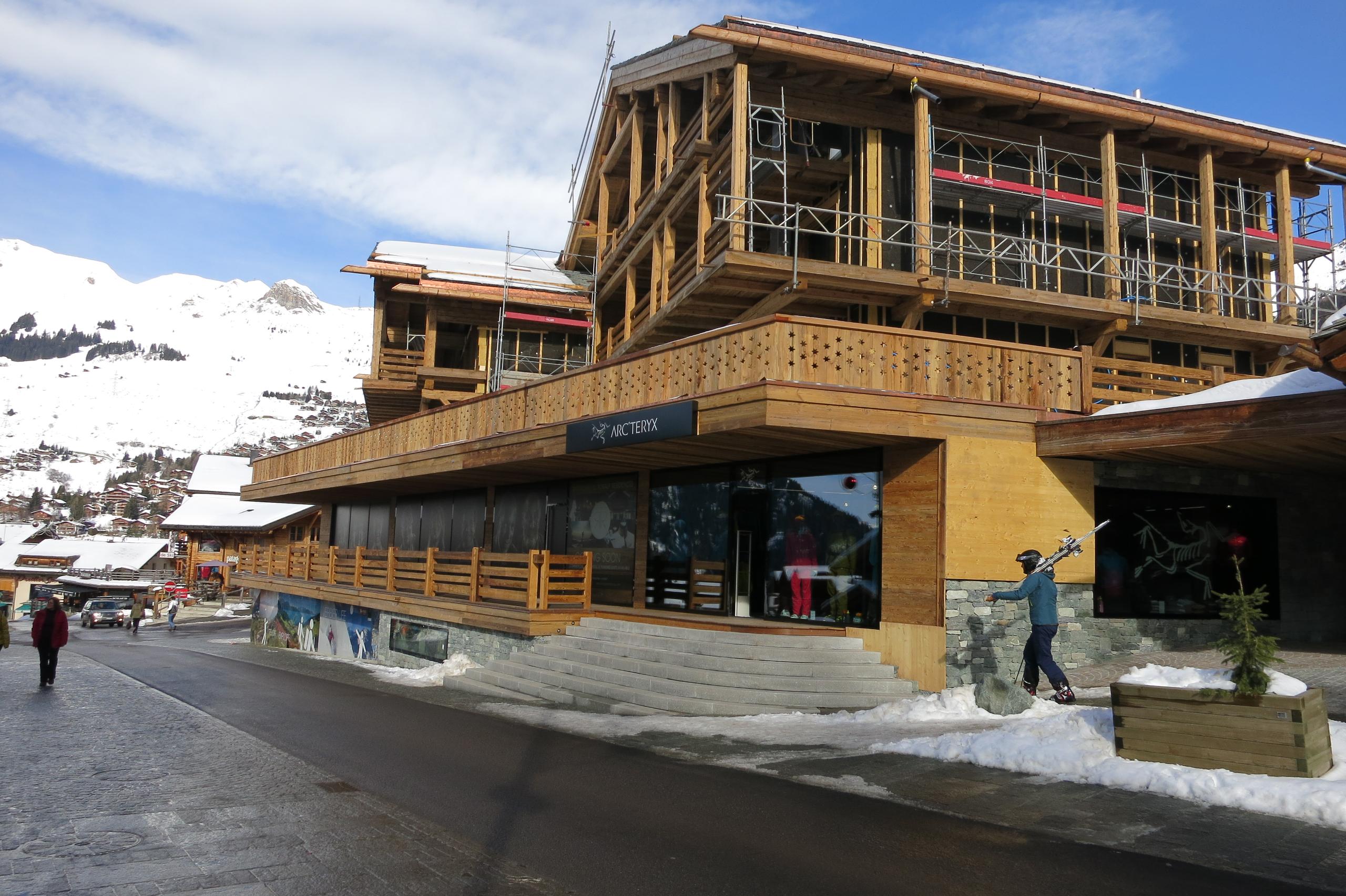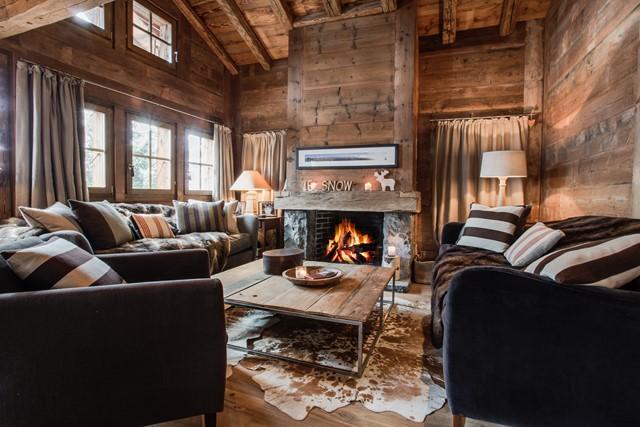
Verbier businesses: Keep calm and carry on

A strong currency, tighter restrictions on second homes, falling numbers of skiers and erratic snow conditions: Swiss ski resorts and local firms have their work cut out. swissinfo.ch asked property agencies in Verbier how they were coping.
It is a crisp Saturday morning in Verbier in early February. A steady trickle of heavily laden cars with skis on the roof pull up outside Agence DomusExternal link, one of the resort’s oldest property agencies.
“It’s Belgian week,” explains office manager Carla Ladeiro.
Inside, she welcomes the tired new arrivals like old friends: “Hello Mrs Peters, how are you? Your chalet is ready as usual, here are your lift passes, and here is some apricot jam from Valais and a bottle of wine.”
Verbier, a sprawling upmarket resort in canton Valais, is known for its challenging skiing and lively nightlife and is especially popular with the French, Scandinavians and British, including the odd royal.
Today 40 Belgian arrivals are expected. Domus, like many Verbier agencies, relies heavily on loyal returnees – generations of winter sport fans, especially families, who have rented the same apartment or chalet for years.
But the warm welcome belies concerns among the local real estate sector.
Snow fell late this season, resulting in fewer visitors over the Christmas period. Bookings are relatively good for February, but in general, rentals are said to be down 20% compared to 2015.
“We have the feeling many people have gone skiing elsewhere in the eurozone countries to benefit from the advantageous exchange rate,” says owner Milko Picchio. “We are prisoners of the strong franc.”
In January 2015, the Swiss National Bank unexpectedly removed a CHF1.20 per euro exchange rate peg. The Swiss franc quickly appreciated, making holidays and property more expensive. It is now CHF1.10 per euro. Meanwhile, since 2014 the euro has depreciated against major currencies, making Austrian and French resorts around 6% cheaper. External link
Luxury
Stephanie Melly, rentals manager at Bruchez & GaillardExternal link, one of Verbier’s biggest agencies, agrees that business is tough.
“A few years ago people came for two weeks over Christmas but now it’s just the New Year week,” she notes.
The agency is trying to turn things round via a new website that offers all-inclusive package deals. Early bookings received a 10% reduction. Visitors get 10% off vouchers to use in shops and a bottle of ‘Bruchez’ Fendant wine is thrown in. But visitor numbers are still down in 2016.
“We have lots of advantages, but we remain a luxury resort. Only people with money come to Verbier,” says the young manager, as she shows me round a six-bed chalet being prepared for the arrival of a French family and their dog.
The 22,000CHF ($22,300) per week price tag for the three-story property is at the top end of their range, but includes a babysitter, cook, and direct access to a nearby ski slope.

Ski properties in SwitzerlandExternal link are reportedly among the most expensive in the world, pushed up by the strong franc. However, agents have other concerns beyond the exchange rate.
On January 1, 2016, the controversial Lex Weber building regulations came into effect. These are aimed at restricting new second homes and so-called ‘cold beds’ in Swiss towns and villages to 20% of the commune’s total housing stock to help preserve the environment and encourage sustainable tourism.
The tourist-dependent Valais region strongly resisted the initiative. Experts predicted there would be limited scope for new development in resorts like Verbier, which exceed the 20% cap (60%), fewer sales and modest price falls.
Daniel Guinnard, director of Guinnard Real EstateExternal link, says despite Lex Weber the local market is remarkably “stable”. In the last couple of years more chalets and apartments have been put on the market, and prices are lower for older properties (-2 to -3%) but higher (+2 to +4%) for more recent residences.
“At the start of Lex Weber, from the moment we started talking about it [around 2007], there was a drop in the total number of transactions. Things then stabilised and from 2012-2015 there was a slight increase, about 5-6% a year. Despite the global crisis, the economy is better than when we had a good sales period in 2000-2005,” says Guinnard.
Falling numbers
Picchio agrees that sales – 50% to Swiss and 50% to rich British, Scandinavians and French – are not bad: “There have been tougher years when we sold next to nothing but it’s not the case. Last year was also quite good.”
In the long- run Lex Weber will restrict business, he admits, but ‘we have no choice’.
“Has the legal insecurity [surrounding the Lex Weber] now gone?” asks Guinnard. “I’m not sure, but I have difficulty seeing how we’ll apply the law in many cases. In the medium-term, the Lex Weber will lead to higher prices, as we just cannot build any more. It reduces the offer but demand remains stable.”
Perhaps a bigger issue for property agents and potential chalet buyers is that in the main ski markets of Switzerland, Austria, France, Italy, the US and Canada, skier numbers have been falling steadily since the 2012-2013 season, according to Laurent VanatExternal link, a Geneva-based consultant.
The long-term trend is disquieting. Separate figures from the Swiss Cable Car AssociationExternal link, show that between 2003 and 2015, resorts saw a 24% drop in the number of skier days (or ski visits), with a steady decline from 2008-2009.
The problem is partly due to demography. Between 2001 and 2011, the percentage of Swiss adults aged 20-29 who practised skiing fell from 25% to 18%, according to the cable car association. Switzerland Tourism says society is becoming more multicultural and urban, with parents who do not ski, and fewer schools organising ski camps for their students.
“In the past, we were obliged to go skiing. Today people have endless options. But skiing remains expensive. A family day out in Verbier can cost several hundred francs,” says Guinnard.
Melly, however, is convinced youngsters are still interested in winter sports. But she believes Europe’s baby boomers – the parents who pay – are starting to prefer ocean waves to moguls.
“Ten years ago it was full in April at Easter. Now business is much tougher. We have to compete with really amazing offers from the beach resorts towards the end of the season,” she adds.
Lex Weber – the fine print
Switzerland has approximately 500,000 second homes. Most of them are found in five of country’s 26 cantons: Bern, Graubünden, Ticino, Valais and Vaud. Those in tourist regions are not commercially operated and are occupied on average 30 to 40 days a year.
Under the changes to the law, which came into effect on January 1, 2016, construction of new second homes are possible if they do not exceed 20% of residential zones and of the total surface area of a commune.
However, exceptions exist. Where the 20% limit has been surpassed, it is possible to build new apartments or chalets if they are used for sustainable hotel-style complexes, with services such as a reception.
Second homes that were built before the March 2012 initiative was approved can be enlarged by up to 30%. But these must not be transformed into a separate new studio or apartment.
Rundown unprofitable hotels (+25 years) can be transformed into secondary homes – but only half the existing floor space. The remainder must continue as a hotel or be used as a main place of residence. New homes can also be built out of old barns or traditional buildings.

In compliance with the JTI standards
More: SWI swissinfo.ch certified by the Journalism Trust Initiative




























You can find an overview of ongoing debates with our journalists here . Please join us!
If you want to start a conversation about a topic raised in this article or want to report factual errors, email us at english@swissinfo.ch.